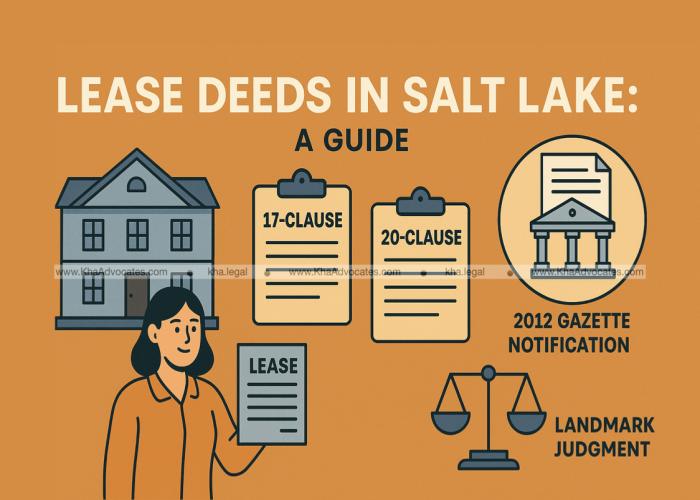
Published on: May 23, 2025
Salt Lake City, officially known as Bidhannagar, was conceptualized and developed under the leadership of Dr. Bidhan Chandra Roy, the then Chief Minister of West Bengal. Conceived as a modern satellite township adjacent to Kolkata, the project involved the acquisition of wetlands and privately owned lands. These lands were subsequently allotted to individuals through lease agreements, each extending up to an unprecedented 999 years—ensuring government control while granting long-term occupancy rights.
Initially, allotments were conducted through a lottery system. However, with time, the issue of property transfers within Salt Lake arose. The restrictive nature of lease deeds and the absence of a clear legal mechanism for transferring leasehold rights led many lessees to opt for unofficial means such as executing Powers of Attorney or Wills—resulting in a loss of revenue for the State.
To address this issue and to establish legal clarity, the West Bengal government introduced a formal framework through a Gazette Notification in 2012. This article aims to provide a comprehensive and simplified explanation of the current legal position, procedures, and key judgments related to leasehold property transfers in Bidhannagar.
Among the earliest lease agreements executed in the 1970s, the 17-Clause Lease Deed granted leaseholders more liberal terms, with no explicit restrictions on the transfer of property. Roughly 88 such deeds were issued to the first group of Salt Lake allottees.
Due to the absence of any clause requiring government approval for transfer, leaseholders under this deed have historically enjoyed greater flexibility. Over the years, the Calcutta High Court has supported this interpretation, directing authorities to process mutations in favour of transferees without insisting on government permission.
Unlike the 17-Clause version, the 20-Clause Lease Deed contains specific restrictions that require prior approval from the Urban Development Department before any transfer of the leasehold property. These restrictive covenants are aimed at maintaining state oversight and regulating the sale of government-leased land.
On June 22, 2012, the West Bengal Government issued a Gazette Notification (No. 2709-SL(AL)/4S-9/2004(Pt-I)) introducing a formal transfer policy for leasehold plots in Bidhannagar. Key highlights include:
Mandatory Government Approval: Transfer of leasehold rights requires prior permission from the Urban Development Department.
Transfer Fee: A fee of ₹5,00,000 per cottah was introduced. However, exemptions apply for intra-family transfers (e.g., to parents or spouse).
Regularization of Past Transfers: Past transactions conducted without government approval could be regularized upon payment of the transfer fee and completion of required formalities.
Binding Lease Terms: All transfers are subject to the original lease terms, and the transferee inherits the obligations of the lease.
This notification primarily targeted restrictive leasehold deeds (such as the 20-Clause Deed) but caused confusion regarding its applicability to 17-Clause Deeds.
This pivotal case resolved key ambiguities surrounding the 17-Clause Lease Deed. The issue before the Supreme Court was whether lessees holding 17-Clause Deeds could transfer their property without government approval or paying the transfer fee mandated in the 2012 notification.
The Apex Court ruled that the 17-Clause Deeds did not require government approval for transfers.
The ₹5,00,000 per cottah transfer fee was deemed applicable only to restrictive lease deeds, such as those containing the 20 clauses.
Past transfers executed without prior permission under 17-Clause Deeds were held valid, provided they complied with other legal requirements.
Government agencies were directed to process mutations for such transfers without demanding approval or fees.
This judgment provided significant relief to lessees and removed procedural bottlenecks for a large number of plot owners.
2016 Circular: Simplification with Conditions
Following the Supreme Court judgment, the Urban Development Department issued Circular No. 693-UD/LM/SL(AL)-4S-5/2016 on May 4, 2016. This clarified the operational procedures for transferring 17-Clause Leasehold Plots:
Prior Approval Not Required: Lessees need not seek permission from the government before transferring their plots.
Mandatory Transfer Fee: Despite the removal of permission requirements, the transfer fee continues to apply—even for 17-Clause Deeds.
Regularization of Past Transactions: Unauthorized transfers can be legalized upon payment of fees and proper documentation.
This circular sought to balance ease of transactions with the state’s revenue interests and legal accountability.
Lease Deed
Allotment Letter
Mutation Certificate (if applicable)
Tax Clearance Certificate
No Objection Certificates (as applicable)
Conduct a thorough title search.
Draft an “Agreement for Assignment of Lease” detailing sale price, terms, and responsibilities.
Prepare an application along with:
Identity proof of buyer and seller
Certified copies of lease documents
Agreement for assignment
Tax receipts and No Dues Certificate
Register on the official portal of the Urban Development Authority.
Upload notarized documents in PDF format (max 2MB each).
Pay the application fee (currently ₹1,000).
Authorities review documents and conduct physical inspection of the plot to match records.
Attend the scheduled hearing with buyer, seller, and legal representatives.
Pay the applicable transfer fee based on plot area.
Submit draft deed for government approval.
Execute and register the final Lease Transfer Deed at the designated registration office.
The government issues a registration order upon approval.
Submit the registered deed to the Urban Development Authority within 60 days.
Apply for mutation to update ownership in official land records.
Obtain a Mutation Certificate upon approval.
Salt Lake’s land transfer laws have evolved significantly since the township’s inception. The early liberal 17-Clause Lease Deeds offered flexibility, later reaffirmed by the Supreme Court, while the more regulated 20-Clause Deeds require strict compliance with transfer procedures.
The 2012 notification and subsequent 2016 circular laid the groundwork for a structured and revenue-conscious framework. While these measures aimed to streamline transfers and reduce irregularities, practical challenges such as administrative delays and lack of public awareness continue to persist.
Understanding the legal nuances and following proper procedures is crucial for any individual seeking to buy or transfer leasehold property in Bidhannagar. For smooth execution and legal compliance, it is strongly advised to consult experienced property lawyers familiar with Salt Lake’s unique lease framework.
At KHA ADVOCATES, our dedicated legal team provides expert assistance for lease deed reviews, mutation, registration, and title verification in Bidhannagar. Contact us today for a hassle-free consultation.
📞 Call Now 94-777-5-888-5 | 🌐 Visit www.khaadvocates.com
Relevant Links:

